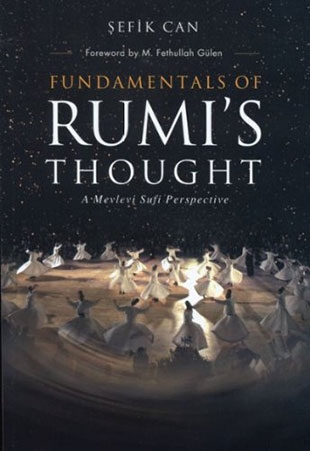Sefik Can was born in 1910 in the village of Tebricik in Turkey. He is the author of nine books on Rumi as well as on poetry and classical mythology. We had the good fortune of meeting him on a Sufi spiritual journey led by Kabir Helminski a few years ago. This scholarly and elderly man who is the ser-tariq (head) of Mevlevis was a gracious host to a group of us who met in his home. Listening to him speak, we realized that he incarnated the courteous spirit of the Prophet Muhammad and the mystic poet Rumi. That same feeling comes across in his splendid and enlightening sourcebook edited and translated by Zeki Saritoprak. It is divided into four chapters. The first presents Rumi's life in the context of the political and philosophical situation of the Anatolian Seljug Empire, with special attention given to the poet's works, his relationship with his father and with Shams, and his migration to the world of eternity. The second chapter examines Rumi's personality and views with excellent assessments of asceticism and ecstasy, Tawhid (Unity of God) and Ittihad (Union with God), reason, beauty, music and whirling ceremonies, sorrow and free will. The third chapter is on Rumi's influence on Turkish poets, on Muslim philosophers, and on the West. The final chapter is on Rumi's Sufi order and his approach to orders.
This extraordinary book is addressed to those who love Rumi, and this comes through most vividly and emotionally in the many stories that Can tells about Rumi and his adab, or courtesy for others. Here are a few examples to whet your interest. They all deal with the poet and seer's exceptional capacity to put himself in the place of others and to serve them as best he could:
"It is related that one day during a whirling ceremony while Rumi was whirling in ecstasy, a drunk entered among the whirling dervishes. He could not control himself. During whirling he would lurch and from time to time hit Rumi. Rumi's friends scolded him. Upon seeing this, Rumi said: 'O friends, he is the one to drink the wine, but you are the ones to get drunk. Why are you scolding him?' Everyone was amazed at Rumi's patience, tolerance, and tenderness."
"One day Vizier Pervane had arranged a whirling ceremony at his palace for Rumi. When Rumi arrived at Pervane's palace, he waited a long time at the door until all the dervishes and friends entered the palace. After all his disciples had entered the palace, he entered as well. After the whirling ceremony was over, all the guests left. Only Rumi stayed there that night. Vizier Pervane showed Rumi a great deal of respect and thanked God that such a great saint was his guest. Once, Husam al-Din Chelebi asked Rumi why he had waited a long time at the door of the palace before entering. Rumi replied: 'If we had entered the palace first, maybe the doormen would not let in some of our friends who arrived after us. So they would not be able to join our company. If we cannot let our friends in a vizier's palace in this world, in the afterlife, how can we let them in the Palace of Hereafter, the Highest Paradise?' "
"One day while Rumi was praying in solitude he was so concentrated that he did not even notice when a man walked in and said: 'I am very poor, I have nothing.' When he saw Rumi totally entranced in prayer he took his prayer rug and left. When Hodja Majd al-Din Maraghi learned about this he immediately jumped up and started searching for this man. He caught the man trying to sell the rug in the Tiz Bazaar. He dragged him to the presence of Rumi. But Rumi replied: 'He must have taken this rug due to his need. Forgive him. We must purchase back this rug from him.' "
